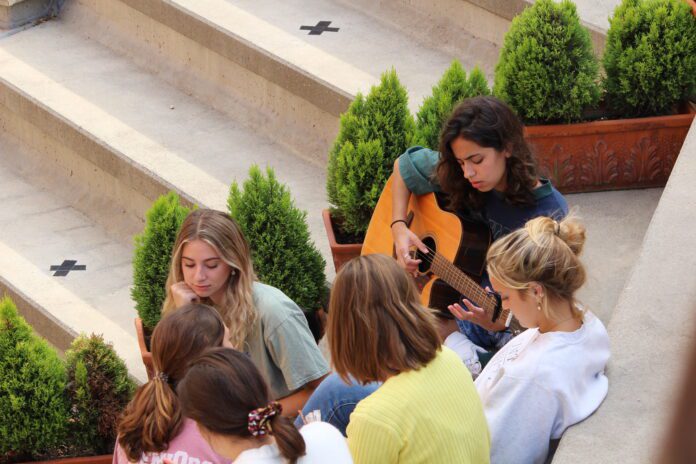A few weeks ago, a wonderful article appeared in The Cor Chronicle describing the numerous opportunities on our campus for students to enjoy themselves and display their own talent through music. From Cap House to Music on the Mall, Battle of the Bands to impromptu concerts on the Haggar piano, music clearly holds a special place in the heart of the UD student.
As a music student here at the University of Dallas, however, I find myself more and more concerned that music, while a beloved entertainment on our campus, is often thought of as no more than just that: an entertainment, a hobby or a method of relaxation. I worry that music has been taken down, albeit unconsciously, from its proper place as one of the quadrivium – as a liberal art.
If you had to describe UD in a few words to someone unfamiliar with it, you would likely say something along the lines of “a small Catholic liberal arts college.” The liberal arts are certainly an essential part of UD’s identity, of how she markets herself with her Core Curriculum. In the classical world, a liberal arts education was made up of two components: the trivium, consisting of the studies of grammar, logic, and rhetoric, and the quadrivium, the studies of arithmetic, geometry, astronomy and music.
Through the Lit Trad series and the several philosophy courses of the Core, UD educates us in the trivium. We read history’s greatest works of literature and most eloquent orations and learn to reason from her greatest philosophers. We are also required to take a course in mathematics, which for many of us is Euclidean and non-Euclidean geometries, as well as a course in a physical science, such as astronomy.
But music is left by the wayside, and, though beloved, is relegated to the realm of entertainment.
Yet it is by no accident that music traditionally holds a place of honor in a liberal arts education. Far beyond entertainment or a way of having a good time (though I do not deny that it can be and is both), music actively forms the soul of the participant, both the one making the music and the one listening to it.
Take the famous words of Socrates on the subject in Book 3 of Plato’s “Republic:” “Musical training is most important. . .because rhythm and harmony permeate the innermost element of the soul, affect it more powerfully than anything else, and brings it grace, such education makes one graceful if one is properly trained, and the opposite if one is not.”
If here at UD we are seeking an education that “permeates the innermost elements of the soul,” as I hope and suspect that many of us are, we ought to include in that education the study of music. It ought to be more to us than entertainment; it ought to be formative.
It therefore saddens me that UD, so strong in many academic disciplines, is so limited in the musical education she offers us. But perhaps our music department is so small because we as the student body do not present enough interest in music as a liberal art to support a stronger program. Perhaps we as students need to recognize the importance of musical education and show a greater desire for it.
It is no coincidence that music is involved in the worship of practically every religion – that it is always present at the most sacred times. It is no coincidence that practically every human being enjoys music of some kind and that it evokes deep emotion in us. Music speaks to something fundamental in our nature. It “permeates” us, and therefore it deserves a more prominent place in our education.
